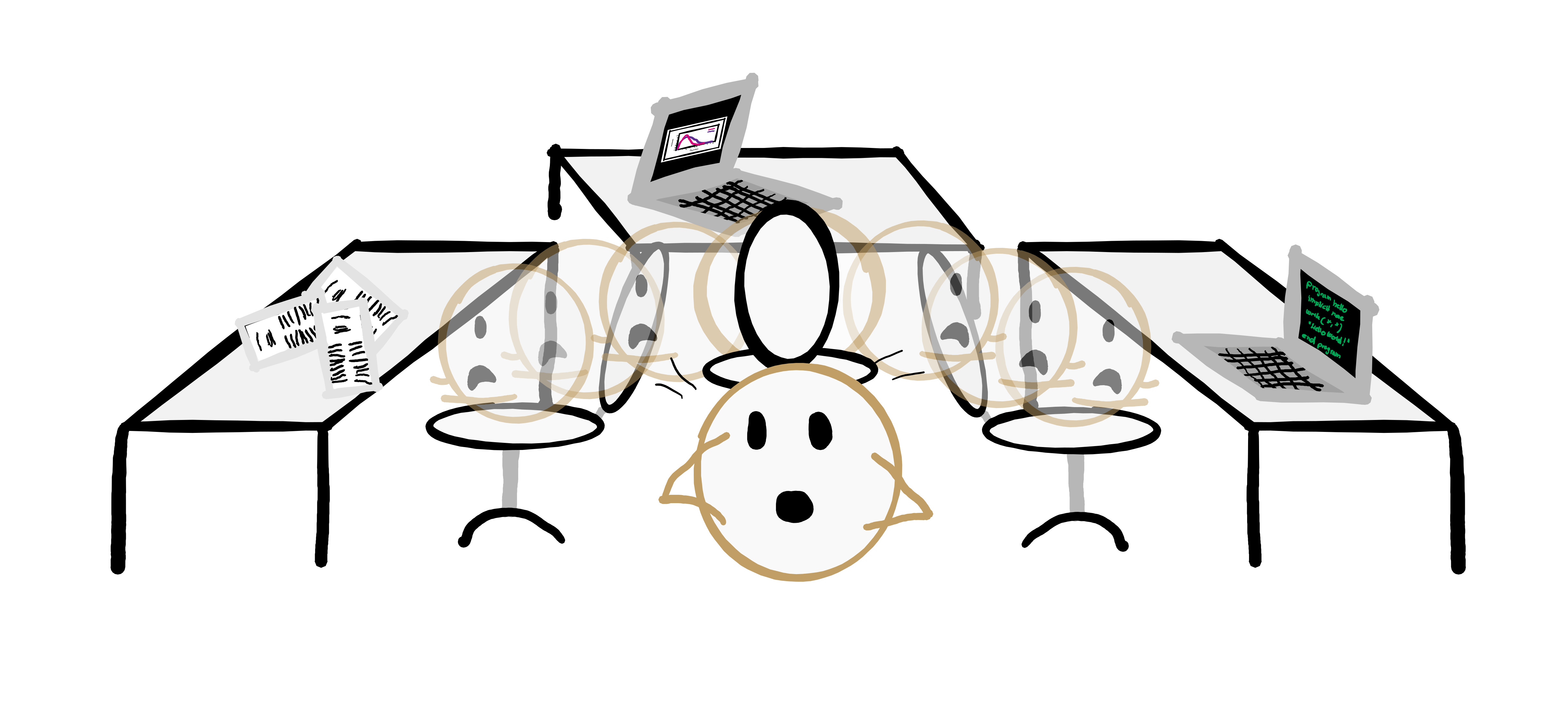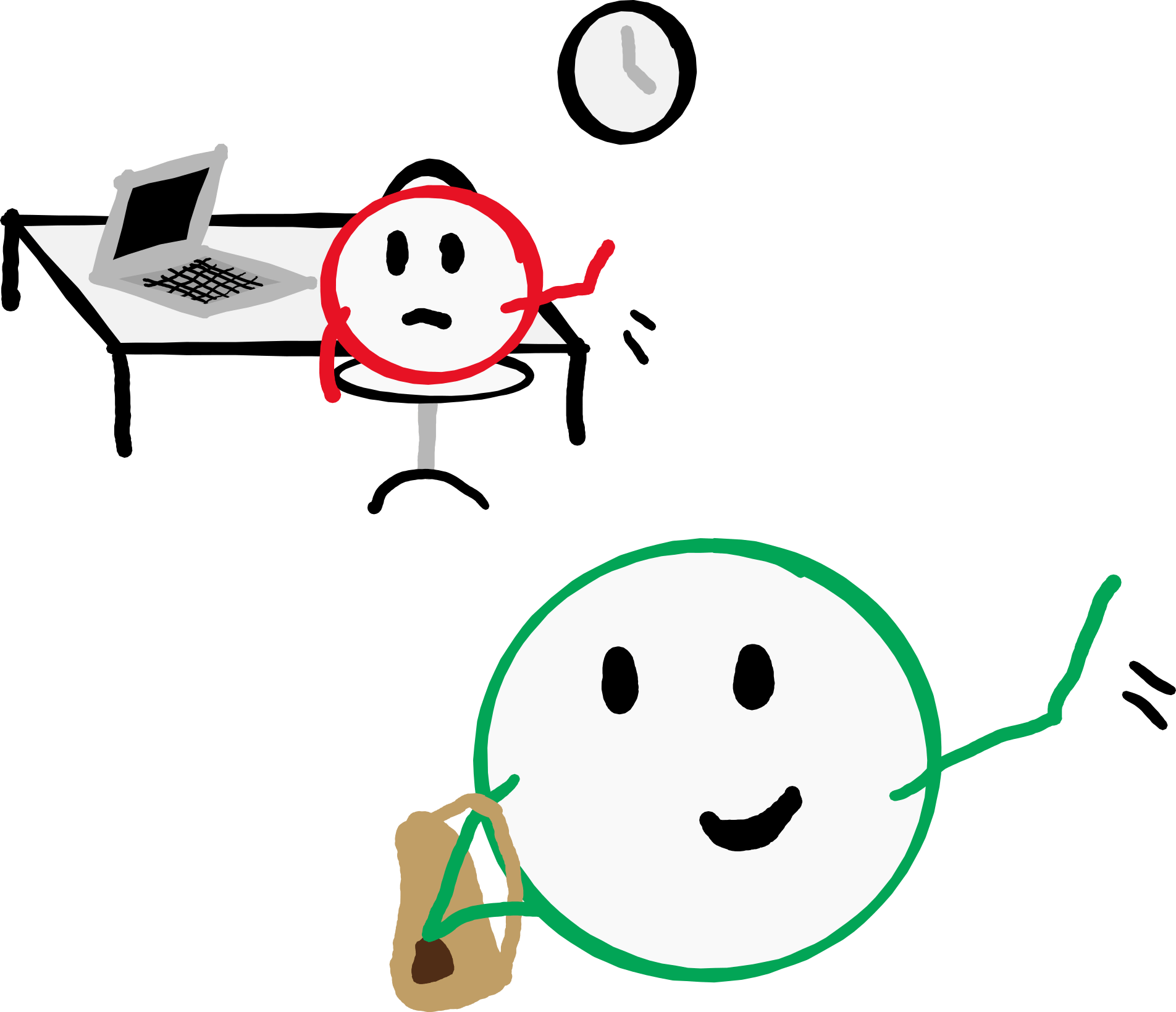In my series “How to PhD”, I would like to present different aspects of the life of a PhD student, or more generally, a researcher. Who has not studied or done a PhD (yet) has usually little idea of how research actually works. I would like to change that in an entertaining way and in small servings! The focus of this article: flexible working hours.
In times of Corona, many people work from home. At home, however, there are no opening hours, no changes of shifts, and no attendance times. Everyone works flexibly at home, albeit to different degrees.
Most researchers, too, now have to unravel the world from the couch. As a theoretical physicist, I belong to a privileged group: My daily work routine has hardly changed since Corona. All I need for work is a computer and a decent internet connection. The only difference is that now I sit in my bedroom in a baggy jumper thinking about bugs in the code. Instead of sitting in a baggy jumper in the university.
As a theoretician, I don’t have an experiment that needs me. My projects are largely independent from others. I do collaborate with other people but the meetings are planned ahead. There are only a few appointments where my presence is expected. In other words, I can work whenever I want. Even before the home office.
This is true not only for theoreticians but also in other research fields. Experimental physicists naturally have experiments that require their presence in the lab. And because several people often work on the same set-up, they have to coordinate. But even here there is a certain flexibility because even experimentalists don’t carry out experiments for 8 hours every day.
In many working groups, a core time crystallises when everyone is in the office. It’s simply easier to knock next doors if you have a question (or want to have a coffee). And it’s more sociable anyway.
Flexible working hours have undeniable advantages. Doctor’s appointments and visits from builders are no problem for me. But with freedom comes responsibility. There are different approaches to dealing with this. I would like to introduce you to the five most familiar ones:
1. The Swiss clock
Flexible working time is an offer, not an obligation. The Swiss clock sets itself fixed working hours and sticks to them. They sit at their desk at 11:30 a.m. sharp and conscientiously do whatever needs to be done. They take an hour for lunch, and at 4.30 p.m. sharp they go home. Physics done, check. They are also known for accepting any kind of work without grumbling and working on it in an exemplary manner. Another day without any research breakthrough? Nevermind, work is work.
By the way, you haven’t miscalculated. The working hours of the Swiss clock add up to four hours a day. In fact, most doctoral students only have a 50% position. So they are paid for four hours but in practice, they often work eight hours or more. After all, doing a doctorate is more of a hobby anyway…
2. The workaholic
No fixed working hours means never calling it a day. Why stop? You can listen to a lecture from the last conference during dinner, that no “real” work. And it’s nice to read in bed, so before sleeping you can quickly look through the latest publications. More work means better results!
Because the fact is: In research, it only matters how good your results are. Not how long it took you to get them. No one has ever received a high-rank publication for the dry result that an idea doesn’t work, just because it took three years of work. There’s only one thing that helps: work more, produce more results, and eventually something groundbreaking will come out of it!
3. The night owl
The night owl is probably the only species in this list that really grooves flexible working hours. Finally, no more lectures, no more deadlines, and no one expecting them to be at uni at set times. So they can finally spend the evening relaxing with computer games. There’s also no annoying sunlight at night reflecting on the screen. What, 4 o’clock again? Well, a good night’s sleep is important, and 12 o’clock is as good a time as any to start work. What, the others want to have lunch at 12:30 already? Phew, well, chili for breakfast is nice too. But wait, who scheduled the group seminar for 11 am tomorrow? Who’s supposed to concentrate on anything in the middle of the night?
4. The squirrel
Flexible working hours often mean that no one tells you exactly when you have to do what. This requires a fair amount of work organisation. There is always something you could learn a little bit more about. Be it due to intrinsic curiosity or the high expectations of academia. In the case of the squirrel, it boils down to wanting to do everything at once, and ultimately not getting anything done. It then looks like this:

“I’m going to start working on my programme, but wait, I have to implement this method, and there’s this one step I haven’t quite understood yet, so I’d better read through the publication again, but it’s going to take a while, and I have to prepare this talk, so that’s more important for now, so I’d better start, best with the graphical representation of the results, the plot doesn’t look that nice yet, the line width is definitely too small, and the colours don’t work at all, but hm, now that I look at it, the results themselves don’t look that good yet, the resolution is still quite low, so I better run the simulation again, maybe it’s the bug in the code with this one method I wanted to read up on…”
5. The scholarship holder
Scholarship holders are a rather rare species, but characteristics of typical scholarship holders can also be found in other PhD students, too.
Scholarship holders usually do not have a job in addition to their scholarship. This may sound silly. Why should you get a scholarship and a salary? But unfortunately, there are also such tiny details as health insurance. Therefore, lucky scholarship holders have a part-time job to pay the necessary social security contributions.
No job means no rules (at least in theory). As a scholarship holder, you are your own boss. Not only are your working hours flexible, your whole PhD is flexible. Just stay at home for a day and do nothing? No problem. Requests for holidays? There is no such thing. Sick notes? Who needs them. Pay for your own holiday? Better do a three-week language course in Barcelona to “learn Spanish”.
Sounds fantastic, but it has its downsides. Anyone who assumes that the number of holiday days will increase as soon as you no longer have to take formal leave is mistaken. Scholarship holders naturally want to live up to their reputation, the motto is: achievement, achievement, achievement. Flexible working hours make it possible to organise a dozen other projects on the side. This means: quickly engaging in street activism after university, discussing the opportunities and risks of citizens’ decisions at a seminar at the weekend, playing music in a Mozart tribute band once a week, organising a panel discussion for your favourite party, and participating in a working group on the topic of “Is reinforcement learning species-appropriate?” instead of taking a holiday. Oh, and of course don’t forget to save the world!
Do you like what you read? If you don’t want to miss any new posts, don’t forget to subscribe to my blog.




